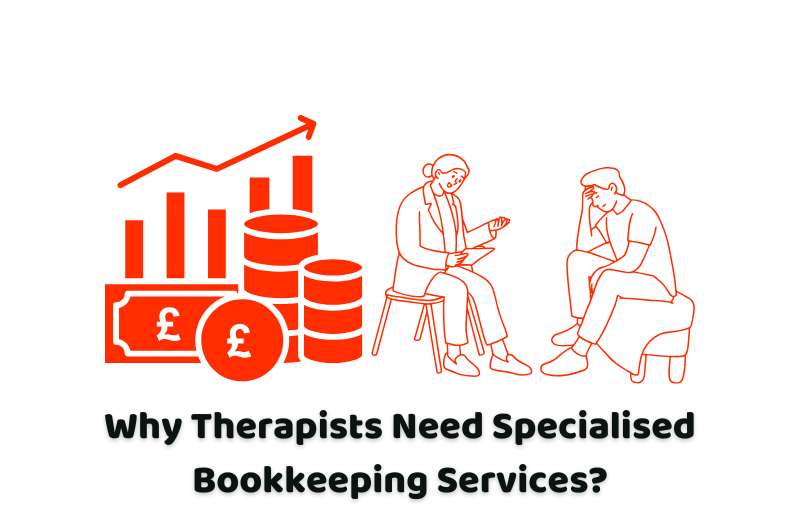Why is Bookkeeping Important for Therapists?
Therapists spend their days helping clients manage stress, anxiety, and life’s challenges. But when it comes to managing their own business finances, many therapists find bookkeeping to be one of the most stressful parts of running a private practice.
From tracking income and expenses to dealing with HMRC tax rules, bookkeeping is time-consuming and complex. That’s why an increasing number of therapists are turning to professional bookkeeping services to keep their financial health in order.
In this article, we’ll explain why therapists need bookkeeping services, the benefits of outsourcing, and how it helps therapists focus on what matters most to their clients.
The Challenges Therapists Face with Finances
Whether you’re a counsellor, psychotherapist, or occupational therapist, running your own practice comes with financial responsibilities that can quickly pile up. Common challenges include:
-
Irregular income: Many therapists work with clients on flexible schedules, which can make predicting monthly cash flow difficult.
-
Multiple income streams: Income may come from individual sessions, group therapy, workshops, or even insurance providers.
-
High expenses: Office rent, supervision fees, CPD courses, and professional memberships can quickly add up.
-
Tax deadlines: Self-assessment tax returns, VAT, and National Insurance contributions can be overwhelming to manage.
-
Time constraints: The hours spent reconciling receipts could be better invested in client sessions or practice growth.
If these sound familiar, our Bookkeeping Services in London are designed to give therapists more time and peace of mind.
Why Therapists Need Bookkeeping Services
Here are the top reasons why therapists should consider outsourcing bookkeeping to professionals.
1. Save Time and Reduce Stress
As a therapist, your expertise lies in supporting clients, not balancing ledgers. Bookkeeping takes hours each week — hours that could be better spent on therapy sessions, research, or professional development. Outsourcing frees up your time and reduces the stress of managing numbers.
2. Stay Compliant with HMRC
Tax compliance is non-negotiable. Missing deadlines or misreporting income can lead to penalties and unnecessary headaches. A professional bookkeeper ensures:
-
Accurate income and expense records
-
On-time VAT returns (if registered)
-
Proper payroll management if you employ staff
-
Smooth self-assessment submissions
Check out our VAT Return Services for hassle-free compliance.
3. Improve Cash Flow Management
Cash flow problems aren’t unique to large businesses — therapists face them too. With irregular client bookings, it’s easy to run into shortfalls. A bookkeeper helps by:
-
Tracking incoming and outgoing payments
-
Setting up forecasts for slow months
-
Advising on keeping reserves for tax liabilities
Explore our Financial Reporting service in London for a clear picture of your cash flow.
4. Track Business Expenses Accurately
From therapy room rental to CPD training, therapists have a wide range of deductible expenses. A bookkeeper ensures you claim all allowable costs, which reduces your taxable income and saves money.
Our Expense Tracking Services in London categorise your costs so you never miss a claimable expense.
5. Gain Better Financial Insights
It’s not just about compliance. A good bookkeeping system provides insights into your practice’s performance. For example:
-
Which services generate the most revenue?
-
Are certain months consistently slower?
-
How much should you set aside for reinvestment?
Having this data helps you make smarter business decisions.
6. Prepare for Growth
If you’re planning to expand your therapy practice — by hiring staff, moving to a larger office, or offering new services — you’ll need reliable financial records. Bookkeepers ensure your accounts are organised, making it easier to apply for business loans or plan future investments.
DIY Bookkeeping vs. Outsourced Services
Many therapists attempt to manage bookkeeping themselves, often using spreadsheets or basic accounting apps. While this can work in the early days, it becomes unsustainable as the practice grows.
| DIY Bookkeeping | Outsourced Bookkeeping |
|---|---|
| Time-consuming | Saves hours each week |
| Risk of errors | Professional accuracy |
| Stressful during tax season | HMRC compliance guaranteed |
| Limited insights | Detailed financial reports |
Clearly, outsourcing provides far more value and peace of mind.
How Bookkeeping Services Work for Therapists
The process of outsourcing bookkeeping is simple:
-
Initial Consultation: Discuss your practice, income streams, and bookkeeping needs.
-
Secure Access: Safely link your accounts, invoices, and receipts via cloud software.
-
Regular Updates: Your bookkeeper reconciles transactions and provides reports.
-
Tax & Compliance: All filings and records are kept up to date.
-
Ongoing Support: Advice and insights to help you grow your practice.
At Bookkeeping Services Accountants, we use cloud-based systems like Xero and QuickBooks to ensure therapists always have real-time access to their finances.
Final Thoughts
Therapists dedicate their energy to improving clients’ well-being. The last thing they need is the added stress of bookkeeping. By outsourcing to professionals, you’ll save time, reduce errors, improve cash flow, and ensure compliance with HMRC.
At Bookkeeping Services Accountants, we specialise in supporting small businesses and professionals, including therapists. Our tailored bookkeeping solutions give you financial clarity and peace of mind so you can focus on what you do best, helping others.
Ready to simplify your bookkeeping?
Contact us today to see how we can support your therapy practice.

